Join us for real-time updates from Automotive Evolution North America 2024 at The Henry Hotel in Dearborn on 30-31st October, where industry leaders from Volkswagen, GM, Toyota, Stellantis, Ford and many more will hold key sessions and panels on topics including smart manufacturing, sustainability, EV plants, and digital tools.
We are back for our second edition of the AMS Automotive Evolution North America 2024 in Michigan! As North American OEMs and suppliers upgrade facilities and build new EV and battery plants, the conference will explore strategies to meet evolving customer demand and regulatory challenges.
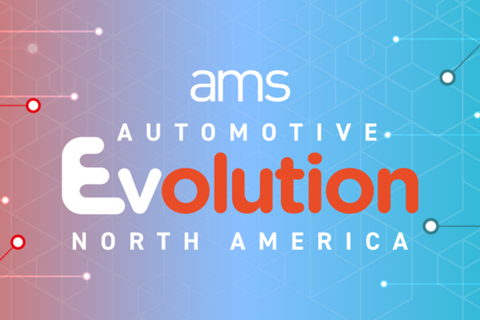
Speakers including Christopher Glover from Volkswagen Group of America, Chattanooga Plant, Jaime Moore from Toyota Motor North America Research and Development Center, Dr. Sardar Asif Khan from Stellantis, Marc Dugas from Ford, Brian Breuhan from GM and many others will deliver insightful sessions.
Throughout the event and after, we’ll be providing coverage with insights, updates, and key takeaways. Read our blog below to know more!
13th October
Jeremy Keating, Vice President of Operations at Kokomo Transmissions-Stellantis, shared insights into the importance of lean methodologies in managing product launches, enhancing operational efficiency, and building resilience in the face of supply chain disruptions.
“Our lean approach starts at the very beginning of the program,” Keating explained, referring to Stellantis’ use of digital twins and simulations. “We focus on early product and equipment management to identify and correct issues in the design phase, minimising costly mistakes later in production.” He noted that Stellantis applies its Production Way (SPW) standards to ensure lean principles are integrated throughout the manufacturing process.
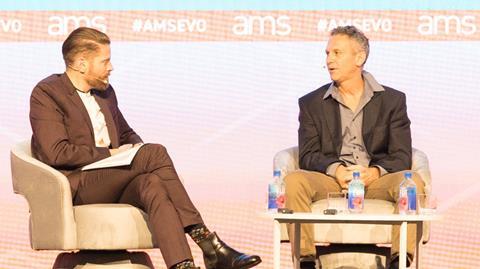
Keating emphasised that cost analysis is at the heart of lean implementation. “We begin by evaluating financial performance to identify waste and inefficiencies,” he said. “From there, we use methodologies like value stream mapping and 5S to refine processes, starting from finance and working down to the shop floor.”
A critical aspect of Keating’s strategy is engaging the workforce. “Communication is essential,” he noted. “Clear roles, KPIs, and daily reviews ensure everyone is aligned. Our union partners play a key role, acting as coaches and helping to involve team members at every level,” he said, sharing examples where empowering team members to design their own processes resulted in higher ownership and improved outcomes.
Keating also addressed the misconception that lean manufacturing reduces supply chain resilience. “One-piece flow without buffers rarely works in today’s volatile environment,” he explained. “Lean must be balanced with inventory strategies to mitigate risks from disruptions. By focusing on what we can control, we make lean work alongside resilience.”
Watch: Stellantis’ Jeremy Keating unpack comprehensive lean practices
13th October
Fernando Bera, Engineering Supervisor and Smart Factory Coordinator at ZF, shared insights on the integration of data and digitalisation efforts at ZF’s Greer, South Carolina plant. Bera spoke of the company’s advancements in leveraging an IoT platform which hosts various apps to collect and process data from the shop floor. Such systems provides critical insights such as “OEE, condition monitoring, and so on,” enabling smarter production processes.
Bera emphasised the flexibility required at the Greer facility to handle both e-mobility and internal combustion engine (ICE) products. He explained how data supports this by improving quality, increasing throughput, and enhancing productivity, particularly in machining. “Our idea is to use this data to improve the quality in our products as well,” he noted.
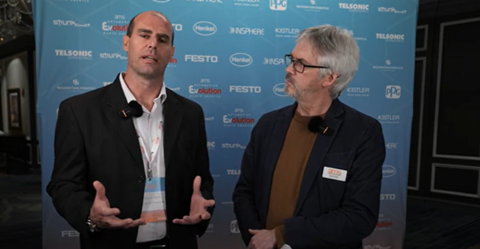
With over 600 machines in the facility, managing data is a significant challenge. Bera explained that the focus is on prioritising key issues, such as scrap and performance problems, using lessons learned to develop smaller pilot projects before rolling them out across the plant. “We are collecting a lot of data, but the most important thing is to prioritise the problems we have in the line,” he said.
The integration of legacy systems with newer technologies is another challenge. While data from newer lines is more structured, legacy systems require prioritisation to identify critical data points. Bera stated, “We are not getting all the data for everything… we are focused on our top priorities.”
Key innovation at ZF involvs creating an open-source dashboard to visualise production line data. This has significantly improved transparency and responsiveness at the company. “Before, it was not possible to predict something, but now… we can react fast to eliminate the root causes,” he explained. Bera attributed this success to the curiosity and initiative of his team, noting, “A smart factory is not about technology; it’s about enabling people to use these tools effectively.”
7th October
Our editor Nick Holt spoke with Rajeev Kalamdani, Manager, IIoT analytics global data insights & analytics at Ford at the conference, who shared powerful insights on the journey toward smart factory digitalisation, touching on critical areas and challenges that define this transformative path in the automotive industry.
“Cross-functional collaboration is key to driving efficiency and success in digital transformation,” Rajeev noted, highlighting the collaborative spirit needed to succeed in this evolving landscape.
Watch the full interview below!
6th October
Editor’s view: Reducing costs, fast-tracking development
Finishing up on our latest Automotive Evolution conference in Detroit we came away with a strong sense of the change in North America’s automotive industry. Gone are the heady days of billion-dollar Capex investment in new electric vehicles (EV) and battery production (although more modest sums continue to be spent) to be replaced by a much more conservative approach towards optimising existing production assets. This reflects the gloomy outlook, as the big car makers struggle to turn a profit from their growing EV production operations. However, as we discovered, these circumstances have triggered another period of rapid development and innovation to support manufacturing operations.
Speaking with senior executives from high-volume OEMs (VW, Toyota, GM, Stellantis and Ford) it is clear they share the same challenges. Cost is a big issue, with a focus on how to make EVs more affordable by reducing the related production costs. This is set against a backdrop of greatly increased energy, materials and labour costs, and weaker demand for EVs than forecasted, which has not helped the OEMs get closer to a profit in this segment. And the in longer term there is the looming threat of fierce competition in the form of much cheaper Chinese EVs.
Addressing the cost issue, we’re seeing a strong focus on optimising the capacity utilisation across the existing production networks and in shortening the development time scales for new products. It was recognised by all that closer collaboration across the design, engineering and production teams is vital to shortening the time to market for new products, without compromising on safety quality and performance, and that simplifying the vehicle builds is an important factor in this. Some of the OEMs have already started with the reorganisation and restructuring of these teams and although initially disruptive this approach is seeing some benefits.
The cost issue also means that the production teams will have to do more with less investment, and this sees a strong focus on optimising existing assets. This ties into our conference themes of flexible, digital and lean production and making the factories smarter and processes leaner and more efficient. Key to this will be the deployment of digital tools.
Also read: Ford, GM, Stellantis fight EV slowdown, tariffs, IRA & China
Our speakers acknowledged that this is an important area of focus going forward as a solution to manage production costs and shorten development timescales. Digitalisation of manufacturing operations is nothing new, OEMs have well-established digital networks and process tools, but the software platforms and digital tools are seeing rapid development, as is the management of the data gathered. And perhaps the biggest step in this is the application of AI. All noted that this was still in the very early stages of assessment and deployment across their respective networks, but that it offered great potential.
With several of our expert panels centred around this topic, the discussions highlighted that while the ambition for large-scale smart factory developments remained, much of the focus is now on smaller, targeted projects within factory operations that can be more efficiently, and cost-effectively progressed to a conclusion. This focus provides validated processes that can be scaled across wider operations.
However, it’s not all about the technology. The engagement of the workforce was also noted as an important factor in the wider adoption of digital systems and automation. Our speakers were keen to emphasise that this wasn’t just about gaining an agreement to these changes, but rather that full engagement and leveraging the vast experience of the factory teams is essential to the success of these projects and their outcomes. As with the above-mentioned closer collaboration of development and engineering teams, this requires a big cultural change in how they approach these new challenges.
It’s interesting to consider that modern vehicle production requires degrees of stability, consistency and repeatability, which favours the simplification and standardisation of processes. So, change and uncertainty would be unwelcome, but as our speakers and delegates revealed, change is vital to the growth and development of the vehicles, the business and the industry. No matter how problematic the changes we are seeing might appear to be, they are the drivers of innovation and, as was noted by the OEM speakers, part of the everyday production cycle.
We still have lots more coverage and interviews coming up. Stay tuned!
4th November
The final session with Gestamp’s Paul Balenger and Ford’s Paul Stephens
For the final session, Chris Ludwig was joined on stage by Paul Stephens, manufacturing transformation lead at Ford and Paul Belanger, director of R&D North America at Gestamp who shared strategies for reducing production costs to support affordable mobility at scale. Both speakers highlighted that affordability is essential to mass EV adoption, with Stephens stating, “Freedom is a function of mobility, and mobility is a function of affordability.” At Ford, Stephens focuses on cutting non-value-added activities and optimising material flow through autonomous mobile robots (AMRs) in production. He explained, “Anything that is not directly adding value to our customer can’t be in our manufacturing process.”
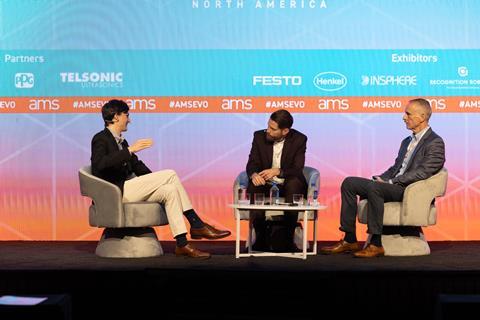
Gestamp is tackling affordability through giga-stamping, a method that consolidates parts while reusing existing assets. Unlike gigacasting, which consolidates large parts with higher upfront costs, giga-stamping allows Gestamp to maximise its current stamping lines. Belanger noted, “Gigacasting is about major part consolidation… but we’re using giga-stamping to maximise our existing assets and keep costs down.” By integrating ultra-high-strength steels, Gestamp simplifies the body shop and reduces material waste, aligning with the industry’s sustainability goals.
Stephens and Belanger underscored the importance of collaboration in today’s automotive industry. Belanger described how Gestamp works closely with customers to design products that are optimised for production, integrating processes from the start rather than making changes later.
Closing on an optimistic note, Stephens expressed confidence in North America’s manufacturing future, crediting young talent: “I’ve never been more confident in the future of the automotive industry… if young talent is excited, then I don’t think we have anything to worry about.”
We still have lots more coverage and interviews coming up. Stay tuned!
1st November
Factory of the future isn’t built overnight
In this session, AMS Editor Nick Holt was joined by Fernando Bera, engineering supervisor and smart factory coordinator, ZF; Raj Sohmshetty, assistant director, industry X research center, Wayne State University and Sanjay Ahire, data scientist, Ford Motor Company, who shared insights on crafting effective smart factory roadmaps. The session highlighted that success in digital transformation is a balance of advanced tools and committed people.
ZF’s Fernando Bera emphasised a people-centric approach to digital transformation, where real-time data drives efficiency and innovation. “The future is no paper, no wasted time—only direct machine data driving our process improvement,” he explained, stressing ZF’s focus on minimising inefficiencies. Fernando noted that young, tech-savvy interns have become vital to ZF’s initiatives, bringing fresh perspectives and speed to shop floor solutions. “We need to filter the noise on the shop floor versus strategic goals to balance immediate needs with our smart factory roadmap,” Fernando added, underscoring the importance of prioritising projects that align with ZF’s long-term digital vision.
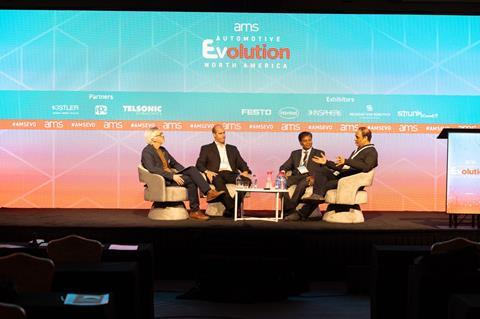
Raj Sohmshetty from Wayne State University shared a structured roadmap for companies beginning their digital transformation journey. He advocated for starting with specific problems rather than broad digital goals. “Each digital twin model must add to a larger framework, helping connect processes across lines and plants,” he explained. For Raj, each digital twin and data model is a critical building block that contributes to an overarching digital ecosystem. This systematic approach not only solves immediate issues but also creates a foundation that companies can expand across multiple plants.
Ford’s Sanjay Ahire highlighted the importance of gradual scaling and team buy-in for successful smart factory implementations. “I believe in starting small—bits and pieces add up and build confidence in smart factory solutions over time,” Sanjay noted, sharing that focused pilot projects can demonstrate immediate value and foster support for larger initiatives. Drawing from his experience with challenges like unreliable Wi-Fi in large plants, Sanjay pointed out that scalability requires adapting solutions to real-world infrastructure limitations. He emphasised the value of collaboration across departments, noting, “A solution won’t work unless someone on the shop floor is there to champion it—it’s as much about people as it is about technology.”
All three speakers agreed that smart factory success is rooted in continuous improvement and a shared commitment across teams. As Raj observed, “Our goal is to build a manufacturing ecosystem in digital space, starting small and adding capabilities as we go.”
Stay tuned to AMS Evolution for more!
1st November
“We’re data-rich and insight-poor”
For our next session, AMS Editor Nick Holt took to the stage with Rajeev Kalamdani, Manager, IIoT analytics global data insights & analytics, Ford Motor Company and Steve Phillips, global digital applications manager - automotive coatings, PPG to discuss how data is transforming manufacturing operations. Both leaders emphasised that effective data centralisation and real-time analysis are crucial for quality and efficiency.
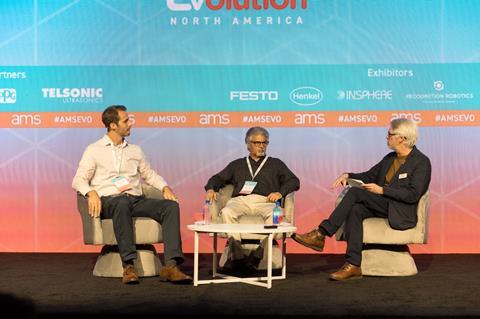
Kalamdani, Ford’s data science and analytics director, explained, “We’re data-rich and insight-poor, especially when older systems build isolated reports. The aim now is centralised, actionable insights.” Ford’s solution, Manufacturing 360, aggregates data from various systems into a single platform, streamlining information access across teams. Ford’s shift to condition-based maintenance has also been a game-changer. “Predictive maintenance has moved from cycle-based to condition-based, allowing us to prevent downtime by monitoring equipment conditions in real-time,” Kalamdani noted, illustrating the value of data-driven maintenance strategies.
Phillips highlighted PPG’s commitment to quality through centralised data applications. “A priority is centralising process data in a user-friendly application—one stop for manual and automated inputs,” he shared. With this setup, PPG has implemented defect vision systems that reveal patterns overlooked manually, enhancing defect prevention. Phillips added, “Time is money, and with data, we can identify problem areas faster, reducing costly defects and supporting real-time corrective actions.”
1st November
Building the factory of the future: Flexibility and zero waste
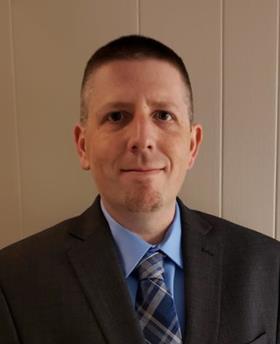
We are back after a delicious lunch break and joined on stage by Brian Breuhan, global manufacturing optimisation strategist, General Motors and Hiroyuki Natsume, sales director - Industrial production, Kistler Group along with our chief content officer Christopher Ludwig who shared strategies for achieving a flexible, zero-waste factory. Both speakers emphasised how automation, data, and continuous improvement work together to shape the “factory of the future.”
Beginning his keynote, Brian Breuhen outlined his vision for the “Factory of the Future,” where automation and human oversight work together to create a flexible and sustainable manufacturing environment. He emphasised that while many imagine a fully automated, “lights-out” facility, the future factory will still need people “to analyse the data, make decisions, and ensure that the factory is running as efficiently as possible.” Describing this model as a “sustainable green facility,” he explained it would be capable of producing in “batch size of one,” adapting seamlessly to consumer needs.
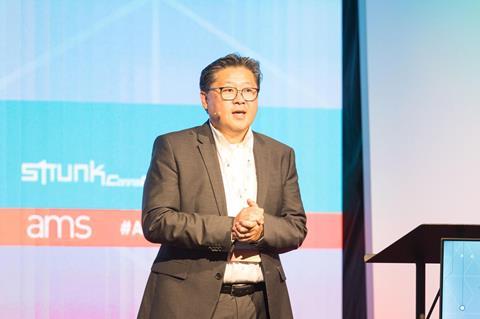
Breuhen stressed the need for a culture of innovation, free from immediate analysis, noting that “as soon as somebody says…that’s impossible, it kind of shuts down the room.” He suggested using broad KPIs (cost, complexity, labour, sustainability) to guide vision planning and highlighted the impact of factory type and volume on technology integration.
Joining the stage later, Natsume highlighted the critical need for comprehensive data as well as detailed insights from each stage of production. “Data from the production line and previous processes are crucial; without these insights, it’s difficult to standardise and optimise effectively,” he explained. By enhancing traceability and connecting data across supply chains, Kistler’s tools allow manufacturers to adjust dynamically, maximising efficiency and quality.
Reflecting on the complexity of data needs, Natsume noted, “Each process may need its own set of data standards and specific instrumentation to support the larger goal of a connected, zero-defect factory.” He emphasised that achieving a true zero-waste environment requires continuous improvement at every level, tailored to the unique needs of each production stage.
31st October
“Lean isn’t just one department; it has to be the entire organisation”
After a quick network break, our chief content officer Chris Ludwig is joined by Dr. Sardar Asif Khan, continuous improvement lead, parts and services, Stellantis and Jeremy Keating, vice-president of operations – Kokomo transmission, Stellantis and shared invaluable insights on how lean methodologies are critical for navigating rapid transformation in automotive manufacturing.
In a keynote, Dr Sardar Asif Khan shared his extensive journey in lean manufacturing, highlighting its ongoing relevance in an era dominated by digital transformation, AI, and Industry 4.0. Despite the rapid technological advancements in the industry, he emphasised that lean manufacturing remains critical, complementing these tools rather than replacing them. “Lean is not just a set of tools; it’s a strategic approach to continuously navigate through the challenges of a transforming industry,” he emphasised. He added that lean manufacturing helps companies stay efficient and competitive by reducing waste and focusing on value-added activities, making it applicable across various sectors, including healthcare and software, not just traditional manufacturing.
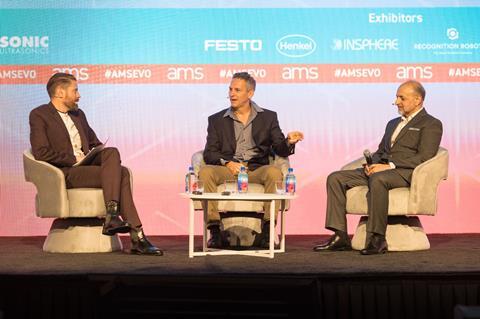
Reflecting on today’s competitive landscape, Dr Khan said that “the pricing power has shifted from manufacturer to the market,” driving companies to innovate and perfect their execution to stay ahead. He further discussed how top companies like Toyota and Tesla have achieved success by embedding continuous improvement systems, which, he believes, are essential to create and sustain competitive advantages. At Stellantis, he implemented the SPDS system, blending FCA and PSA processes into a comprehensive, global approach.
After the keynote, Jeremy Keating joined Dr Khan and Chris on stage and explained how lean practices are integrated from the very beginning of product and process development. “Lean isn’t just one department; it has to be the entire organisation. Everyone has a role and a process that can be measured,” Keating noted, emphasising that lean success depends on broad organisational involvement. At Stellantis, this includes training team leaders early in lean principles and involving them in digital simulations and virtual reality exercises to preemptively resolve design and production issues. Keating added, “Our goal is to enhance value-added activities and reduce waste, ensuring that people contribute to efficient, quality-focused production.”
Both speakers agreed that lean is as much about people as it is about processes. Keating highlighted the importance of collaborative relationships with union counterparts, which help engage all levels of staff and foster a shared commitment to lean principles.
31st October
“We’re going to have to do things through simulation,” Jamie Moore, senior principal engineer, Toyota Motor NA
In an era of constant technological shifts, manufacturing flexibility is crucial for automotive companies to remain competitive. At our following session, Jamie Moore, senior principal engineer, Toyota Motor North America Research and Development Centre from Toyota and Christopher Glover from Volkswagen discussed strategies to scale manufacturing agility and adapt to rapid industry changes.
Jaime described how evolving roles and skills are essential to meeting these demands. “The average engineer’s skill set is expanding,” Moore said, pointing to Toyota’s strategy of rotating team members across functions. This approach builds a more collaborative, adaptable workforce ready to handle increased production demands. “We’re focusing on transferable skills so that you can use those as building blocks to set yourself up for innovation,” she added.
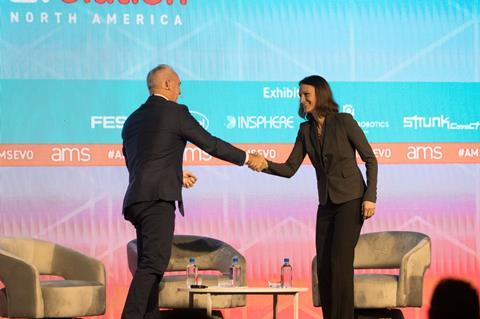
Volkswagen’s Christopher Glover discussed the importance of labour retention in the US, especially in regions with high turnover. “When I got to Chattanooga in the beginning of 2022, we had a labour attrition of 35%. We are turning over our labour three times or a third of our labour every year. And we’ve brought that down to 10% now. So we must be doing something right.,” he shared. This stability supports ongoing skill development and flexibility in production.
Both leaders emphasised digitalisation, including the use of digital twins and simulations, as key to efficient design and manufacturing collaboration. “We can’t build prototypes for everything anymore; we’re going to have to do things through simulation,” Moore explained.
31st October
Building a flexible manufacturing highway at Volkswagen Chattanooga
In today’s kick-off keynote at AMS Evolution North America 2024, Christopher Glover, executive vice-president, Volkswagen Group of America, Chattanooga Plant, took the stage to share a compelling perspective on why flexibility is no longer just a strategic advantage but a business essential. Emphasising the need for “engineered flexibility,” Glover highlighted how the Chattanooga plant’s unique dual-body system allows both electric and combustion models to run on a single line, adapting swiftly to shifting market demands.
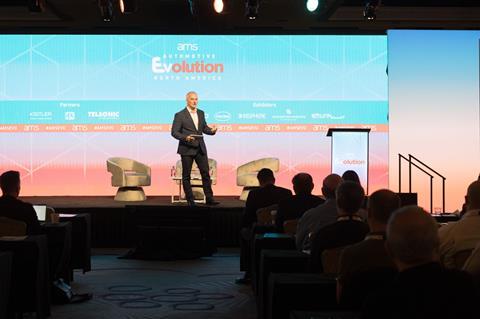
“Flexibility has to be engineered into your production process from the very early phases of concept and layouts,” Glover explained, underscoring VW’s commitment to adaptable infrastructure. This forward-thinking design, combined with automation and human cross-training, enables Chattanooga’s workforce to manage rapid changes in production with ease. “The industry is transforming at an exponential rate, and the only constant in our business is change,” he added, noting that Chattanooga’s versatile production setup allows Volkswagen to weather supply chain challenges and embrace future tech, from EVs to connectivity.
Supply chain management emerged as a recurring theme, with Glover recounting the many challenges VW has faced in recent years—from geopolitical shifts to cyber threats. His approach is proactive: close collaboration with suppliers and real-time logistics monitoring allow Volkswagen to stay agile. And with customer demands rising for features like over-the-air software updates, Chattanooga’s infrastructure is geared up to keep pace.
Stay tuned for more updates!
31st October
AMS Evolution 2024: Day 1 wrap-up and what’s next
Our wrap-up video for Day 1 of AMS Evolution 2024 is here! Yesterday was an inspiring start, with key discussions that set the foundation for today’s main event.
Our chief content officer Christopher Ludwig captured the excitement perfectly: “We’re not just talking about the future of automotive manufacturing – we’re shaping it, one solution at a time.”
Day 1 featured a welcome session with some of our speakers who discussed digital transformation, sustainable practices, and supply chain resilience in automotive manufacturing. Attendees got an exclusive look at some of the latest tech innovations driving efficiency and productivity in manufacturing. It was a fantastic preview of the insights and expertise this event has to offer.
Today, we’re diving even deeper with the main agenda! Expect powerful sessions on:
- Cutting-edge solutions to drive sustainable growth
- Strategic approaches to optimise production lines
- Practical pathways to enhance supply chain resilience and much more
Don’t miss out on the highlights from Day 1 in our wrap-up video, and join us today as we continue to explore what’s next for the automotive industry!
30th October
AMS Automotive Evolution North America 2024 officially kicks off!
AMS Evolution NA 2024 kicked off with an electrifying “Meet the Speaker” session, setting the stage for innovation, adaptation, and industry-shaking insights in automotive manufacturing. Leaders including Christopher Glover from VW Chattanooga Plant, Jeremy Keating from Stellantis, Dr. Sardar Asif Khan from Stellantis, Fernando Bera from ZF, and Paul Belanger from Gestamp dove into the industry’s most pressing transformations and future challenges.
From navigating the EV revolution to fostering a workforce fit for tomorrow, here are the must-know highlights and powerful quotes that captured the audience’s attention.
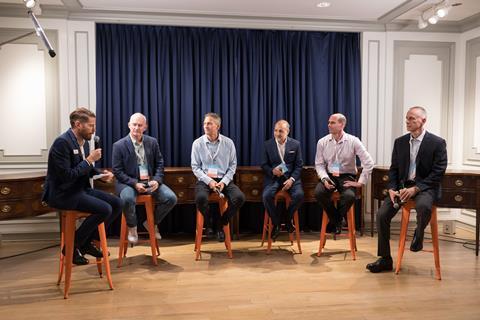
Electrification & transformation
Christopher Glover of Volkswagen captured the spirit of rapid change, describing the shift to electrification as “truly incredible” and the fastest-paced evolution he’s seen in his 40-year career. Reflecting on the pride of innovation, he added, “At the end of a challenging day, I get in my car and think, ‘Hell, we built this thing.’” Dr Asif Khan of Stellantis agreed, noting that AI and digitisation are “transforming every part of the process,” making fast, data-driven decisions a game-changer for future-ready manufacturing.
Cost efficiency & competitive edge
As the race for efficiency heats up, Stellantis’ Jeremy Keating underscored the importance of staying agile with tight budgets, saying, “It’s about finding ways to launch new programs without capital expenditure.” With global competition rising, especially from Asia, he explained how flexible assembly lines and in-house retooling have become critical for success.
Workforce adaptability
Speakers highlighted the importance of adaptability and curiosity in tomorrow’s workforce. ZF’s Fernando Bera shared, “Curiosity drives innovation, especially on the shop floor,” while Gestamp’s Paul Belanger pointed to emotional intelligence as a “vital skill for working collaboratively.” Glover wrapped it up perfectly with four traits for success: “Passion, resilience, teamwork, and leadership.”
Stay tuned for more live updates as AMS Evolution NA 2024 unfolds!
29th October
AMS Automotive Evolution North America 2024 starts tomorrow!
The AMS Automotive Evolution North America conference is going live tomorrow in Dearborn, Michigan. This highly anticipated event kicks off with an evening networking reception, giving attendees an early chance to connect and discuss the trends shaping automotive manufacturing in North America.
Christopher Ludwig, AMS’s Chief Content Officer, will start the evening by introducing key topics and previewing what’s in store for the conference. The agenda for tomorrow includes insights from several industry leaders poised to shape tomorrow’s automotive landscape. Christopher Glover from Volkswagen Group of America is expected to discuss sustainability in manufacturing, while Stellantis’s Jeremy Keating and Dr. Sardar Asif Khan will bring their expertise in digital manufacturing. Fernando Bera of ZF Transmissions will delve into powertrain innovations, and Paul Belanger from Gestamp will address advancements in materials and production efficiency.
With each speaker bringing a unique perspective, this opening session promises valuable discussions around innovation, sustainability, and the digital transformation of the sector. Stay tuned as we cover these insights and much more, sharing key takeaways from the presentations and conversations.
28th October
Mexico’s automotive sector is experiencing a surge in foreign investments, driven by strategic positioning and competitive production costs. Companies like Tesla, Audi, and BMW are expanding EV production in the region, capitalising on Mexico’s skilled workforce and favourable trade relations. These investments align with Mexico’s ambition to be a leader in electrification, attracting significant European and Chinese players, including ZF and BYD.

However, US-Mexico trade policies may limit Chinese companies to the Mexican and Latin American markets due to geopolitical sensitivities. This growth in automotive manufacturing highlights Mexico’s adaptability in the global shift toward EVs.
Despite these advancements, the industry faces challenges, including infrastructure development and navigating evolving trade policies. Nonetheless, with a focus on innovation and sustainability, Mexico is set to solidify its role as a key player in North American automotive production.Explore Mexico’s rise in EV and automotive innovation
28th October
Ford, GM, and Stellantis are navigating complex challenges in the EV sector, from slowed demand and trade barriers to competitive pressures, especially from China. The Inflation Reduction Act’s stringent local content rules complicate eligibility for tax credits, particularly as EV battery materials largely depend on imports from China, leading to rising production costs. Ford has notably pivoted toward hybrid models amid significant EV financial losses, adjusting its production strategies to maintain viability in a changing market.

GM, meanwhile, is addressing similar pressures by reducing its North American EV production plans and delaying some investments. To adapt, GM has partnered with Hyundai to optimise vehicle development, sharing costs and expertise to maintain market competitiveness. Stellantis, facing its own EV-related hurdles, is similarly adjusting production strategies.
These combined efforts underscore how the “Big Three” automakers are recalibrating in response to shifting market dynamics, government policies, and evolving consumer preferences in the EV landscape.
For more details, Read the full article here
24th October
Marc Dugas, Ford’s battery pack assembly specialist, is driving innovation in EV battery production with a focus on simplification and efficiency. While speaking with AMS earlier this year on using the POSIWID (Purpose Of the System Is What It Does) framework, Dugas emphasised the importance of collaboration between design and manufacturing teams to eliminate unnecessary components and streamline the assembly process. This approach is not only improving production speed but also making scaling more practical as demand for EVs increases.
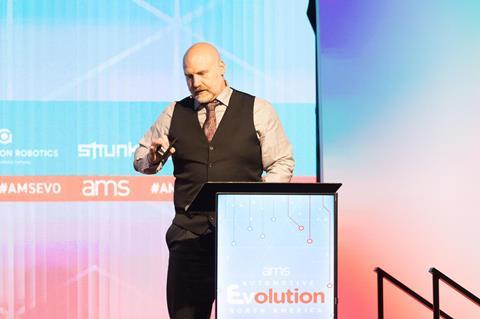
Dugas will present these strategies at the AMS Evo 2024 event, where he will speak in the “Accelerating EV Battery Integration” session. He will share his insights on how Ford is streamlining battery pack assembly through process simplification, component reduction, and enhanced collaboration between engineering and manufacturing teams.
According to Dugas, “Production efficiency is about deleting components and processes.” His philosophy revolves around reducing non-value-added efforts and aligning teams across the production chain, ensuring that Ford’s EV battery assembly processes are both faster and more scalable as the company expands its electric vehicle portfolio
this is how dugas supercharges ford’s battery pack assembly using posiwid. read it here
24th October
Chris Glover, Executive Vice-President, Volkswagen Group of America, Chattanooga Plant, has overseen operations since 2022, and has highlighted the importance of flexibility, digitalisation, and workforce training in managing the plant’s transformation. Speaking to AMS, Glover explained, “The only constant in our industry right now is change […] The automotive industry is currently going through the biggest transformation it has seen in over 100 years – it’s not an evolution, it’s a revolution.”
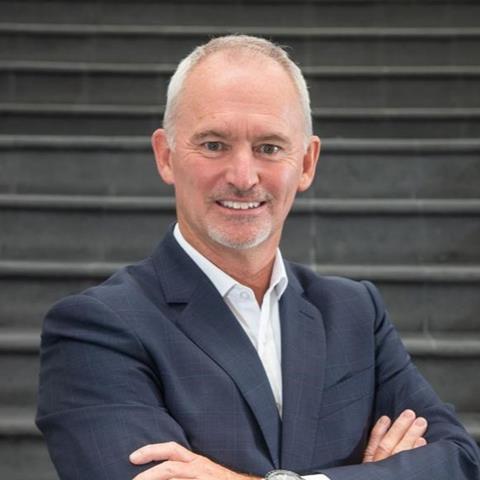
This forward-looking approach is what enables Chattanooga to adapt to the changeable demands of automotive production, from electrification to advanced manufacturing processes, and under the Glover’s leadership, has become a beacon for handling market volatility and the complexities of producing both EV and ICE vehicles.
At AMS Evolution 2024, Glover will deliver a keynote address on the complexities of transforming automotive manufacturing. This process is akin to managing a multi-lane highway, and strategic investment and meticulous planning are essential for enhancing flexibility across vehicle production lines, plant technologies, and workforce development.
Not stopping there, Glover will also speak on the panel, ”Scaling manufacturing agility in the face of constant automotive change.” This discussion will delve into the strategies and tools essential for automotive manufacturers to enhance their flexibility and responsiveness and explore how to achieve greater operational agility to keep pace with evolving market demands.
Read the article: Change is the only constant for Volkswagen Chattanooga EVP Christopher Glove





























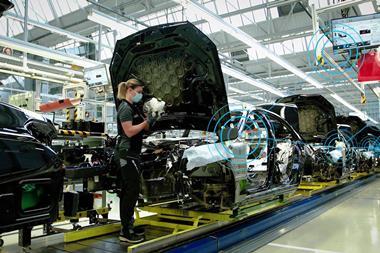
![Asahi Kasei Canada groundbreaking ceremony[48]](https://d2oevnekjqgao9.cloudfront.net/Pictures/380x253/1/5/6/326156_asahikaseicanadagroundbreakingceremony48_273505.jpg)
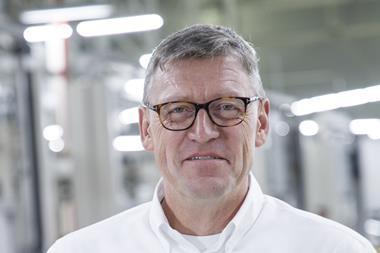
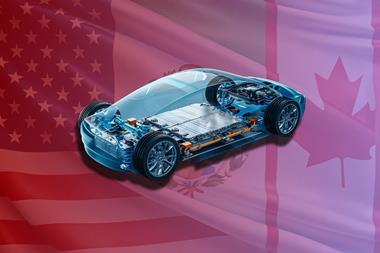
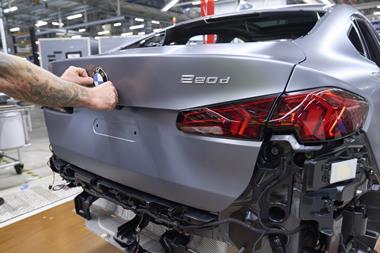
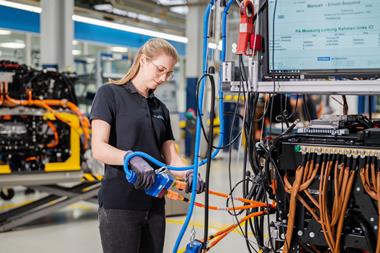


No comments yet